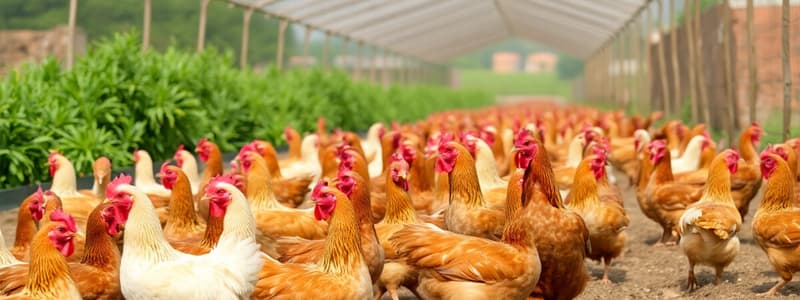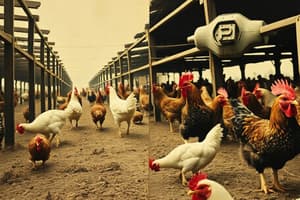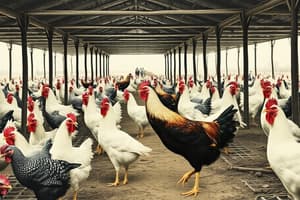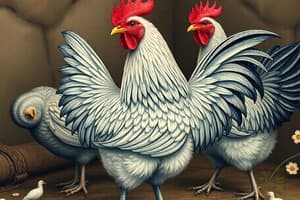Podcast
Questions and Answers
What primary factor contributes to the popularity of poultry raising or production?
What primary factor contributes to the popularity of poultry raising or production?
- Slow reproductive cycles.
- Inefficient feed conversion.
- High maintenance requirements.
- Fast growth rates and efficient feed conversion to meat and eggs. (correct)
Which of the following issues is a significant problem currently affecting the poultry industry?
Which of the following issues is a significant problem currently affecting the poultry industry?
- Highly stable market prices.
- High production costs relative to selling price. (correct)
- Low production costs.
- Lack of consumer demand.
Besides weather, which factor most significantly impedes the success of the poultry industry?
Besides weather, which factor most significantly impedes the success of the poultry industry?
- Efficient market systems.
- Abundant government subsidies.
- Excessive market transparency.
- Insufficient financing. (correct)
What species is recognized as the primary ancestor of modern-day chickens?
What species is recognized as the primary ancestor of modern-day chickens?
In the context of poultry farming, what does 'artificial selection' primarily involve?
In the context of poultry farming, what does 'artificial selection' primarily involve?
A young, immature female chicken that is less than 5-6 months old is referred to as what?
A young, immature female chicken that is less than 5-6 months old is referred to as what?
What term is used to describe chickens that are specifically raised for meat production?
What term is used to describe chickens that are specifically raised for meat production?
Which term refers to examining a shell egg's content by holding it between one's eye and a light source?
Which term refers to examining a shell egg's content by holding it between one's eye and a light source?
The process where birds shed their feathers periodically is known as what?
The process where birds shed their feathers periodically is known as what?
Which characteristic is typical of chicken breeds classified as 'egg class'?
Which characteristic is typical of chicken breeds classified as 'egg class'?
What is a defining characteristic of chicken breeds categorized as 'meat class'?
What is a defining characteristic of chicken breeds categorized as 'meat class'?
Which of the following traits is characteristic of 'general purpose' chicken breeds?
Which of the following traits is characteristic of 'general purpose' chicken breeds?
What primary characteristic defines chicken breeds categorized as 'fancy class'?
What primary characteristic defines chicken breeds categorized as 'fancy class'?
The Ruble, Hulsay, and Claret breeds fall under which classification of chickens?
The Ruble, Hulsay, and Claret breeds fall under which classification of chickens?
At approximately what age are broiler chickens typically ready for harvest?
At approximately what age are broiler chickens typically ready for harvest?
Approximately how long does it take a hen to form and lay an egg?
Approximately how long does it take a hen to form and lay an egg?
What part of the hen's anatomy can be examined to predict the color of the eggs she will lay?
What part of the hen's anatomy can be examined to predict the color of the eggs she will lay?
If a hen has red ear lobes, what color eggs is she most likely to lay?
If a hen has red ear lobes, what color eggs is she most likely to lay?
The vitelline membrane has what purpose in an egg?
The vitelline membrane has what purpose in an egg?
Which structural component of the egg helps keep the yolk centered?
Which structural component of the egg helps keep the yolk centered?
What distinguishes a 'fertile egg' from a 'table egg'?
What distinguishes a 'fertile egg' from a 'table egg'?
What is the significance of chickens being fast multipliers?
What is the significance of chickens being fast multipliers?
Why might high production costs be a major impediment to the poultry industry?
Why might high production costs be a major impediment to the poultry industry?
Which factor has the most profound impact on the genetic diversity of modern-day chickens?
Which factor has the most profound impact on the genetic diversity of modern-day chickens?
What impact does artificial selection have on the traits of chickens and poultry?
What impact does artificial selection have on the traits of chickens and poultry?
Why is the age of chickens divided into pullets, hens, and roosters?
Why is the age of chickens divided into pullets, hens, and roosters?
How does candling impact egg producers?
How does candling impact egg producers?
How can general-purpose chicken breeds be valuable to both small farms and commercial operations?
How can general-purpose chicken breeds be valuable to both small farms and commercial operations?
If chicken breeders focused efforts on the taste and quality of meat, which class of breeds would be most useful and how would this contradict the classification of fancy class breeds?
If chicken breeders focused efforts on the taste and quality of meat, which class of breeds would be most useful and how would this contradict the classification of fancy class breeds?
Meat from broiler chickens are harvested faster when compared to other chickens, what characteristics of broilers contributes to this advantage?
Meat from broiler chickens are harvested faster when compared to other chickens, what characteristics of broilers contributes to this advantage?
Why is it important that hens lay eggs in a predictable window of time?
Why is it important that hens lay eggs in a predictable window of time?
If a poultry farm decides to switch their chickens to another breed. What would influence this decision? Select all that apply.
If a poultry farm decides to switch their chickens to another breed. What would influence this decision? Select all that apply.
The Air cell found in most eggs contributes directly to what?
The Air cell found in most eggs contributes directly to what?
Why are fertile eggs an important category to consider for egg producers?
Why are fertile eggs an important category to consider for egg producers?
What kind of management practices would be considered by a modern poultry business.
What kind of management practices would be considered by a modern poultry business.
Flashcards
Why is poultry raising popular?
Why is poultry raising popular?
Poultry species reproduce quickly, grow rapidly, and efficiently convert feed into meat and eggs, making them popular in agriculture.
Origin of chickens?
Origin of chickens?
Modern chickens are descended from the Red Jungle Fowl (Gallus gallus), native to Southeast Asia.
What is genetic mutation?
What is genetic mutation?
Genetic mutation refers to changes in the genetic makeup which can be influenced by both internal and external factors.
Define selection in breeding?
Define selection in breeding?
Signup and view all the flashcards
What is natural selection?
What is natural selection?
Signup and view all the flashcards
What is artificial selection?
What is artificial selection?
Signup and view all the flashcards
Chick
Chick
Signup and view all the flashcards
Gallus gallus domesticus
Gallus gallus domesticus
Signup and view all the flashcards
Pullet
Pullet
Signup and view all the flashcards
Hen
Hen
Signup and view all the flashcards
Rooster
Rooster
Signup and view all the flashcards
Roaster
Roaster
Signup and view all the flashcards
Capon
Capon
Signup and view all the flashcards
Layer
Layer
Signup and view all the flashcards
Broiler/Flyer
Broiler/Flyer
Signup and view all the flashcards
Flock
Flock
Signup and view all the flashcards
Candling
Candling
Signup and view all the flashcards
Clutch
Clutch
Signup and view all the flashcards
Green chicks
Green chicks
Signup and view all the flashcards
Molt
Molt
Signup and view all the flashcards
Oviposition
Oviposition
Signup and view all the flashcards
Plumage
Plumage
Signup and view all the flashcards
Egg class chickens
Egg class chickens
Signup and view all the flashcards
Meat class chickens
Meat class chickens
Signup and view all the flashcards
General purpose class
General purpose class
Signup and view all the flashcards
Fancy class chickens
Fancy class chickens
Signup and view all the flashcards
Fighting Class
Fighting Class
Signup and view all the flashcards
Broilers
Broilers
Signup and view all the flashcards
Layers
Layers
Signup and view all the flashcards
Egg color and ear lobes
Egg color and ear lobes
Signup and view all the flashcards
Egg color and ear lobes -
Egg color and ear lobes -
Signup and view all the flashcards
Egg color and ear lobes -
Egg color and ear lobes -
Signup and view all the flashcards
Yolk
Yolk
Signup and view all the flashcards
Vitelline membrane
Vitelline membrane
Signup and view all the flashcards
Germ Spot
Germ Spot
Signup and view all the flashcards
Albumen
Albumen
Signup and view all the flashcards
Shell
Shell
Signup and view all the flashcards
Air cell
Air cell
Signup and view all the flashcards
Chalaza
Chalaza
Signup and view all the flashcards
Table Egg
Table Egg
Signup and view all the flashcards
Fertile Egg
Fertile Egg
Signup and view all the flashcards
Study Notes
Poultry Industry
- Poultry raising/production is very popular because poultry species are fast multipliers and growers
- Poultry are efficient at converting feeds to meat and eggs
- Poultry are a good source of meat and eggs
Most Popular Poultry
- Chicken is the most popular poultry
- Muscovy and Mallard ducks are also popular
Current Problems of the Poultry Industry in the Philippines:
- High production costs relative to affordable selling prices
- High cost and unstable supply of good quality inputs
- Inefficient market system due to a lack of market information
- Unstable prices
- Poor grading standards for eggs
- Diseases
- Climate
- Insufficient financing
- Lack of government price support for poultry products
The Origin of the Chicken
- The Red Jungle Fowl (Gallus gallus) from Southeast Asia is the ancestor of modern chickens
- Other species of chicken include:
- Gallus sonnerati (Gray jungle fowl)
- Gallus lafayeti (Ceylonian jungle fowl)
- Gallus varius (Javan Jungle fowl)
What Brought about the Change in Chickens
- Genetic mutation, the change in the genetic make up of certain individuals due to internal/external factors
- Selection is choosing something from a group
- Natural selection accounts for the survival of the fittest as affected by climatic and nutritional differences
- Artificial selection is human interference to achieve goals, leading to chicken development for meat, eggs, fighting cocks, and fancy feathers
Basic Terms in Poultry
- Gallus gallus domesticus is the scientific name for chicken
- Chick: A newborn chicken
- Pullet: A young, immature female chicken less than 5-6 months old
- Hen: A mature female chicken
- Rooster: A mature male chicken
- Roaster: A male or female chicken 3-5 months old, raised for meat production
Poultry Terminologies
- Capon: A castrated male chicken
- Layer: A hen used for laying eggs
- Broiler/Flyer: Chickens grown for meat production
- Flock: A group of chickens
- Candling: Examining a shell egg's contents using a light source
- Clutch: A nest of eggs
- Egg: A hard-shelled reproductive body produced by a bird
- Green: A term for chicks that have recently hatched
- Axial feather: A short wing feather separating primaries from secondaries
- Molt: To shed feathers periodically
- Oviposition: Laying an egg
- Plumage: The feathers of a bird
Classification of Chicken Breeds by Purpose or Utility:
- Egg Class:
- Comparatively small
- Lay large, white-shelled eggs
- They are very active and nervous in temperament
- Non-sitters
- Early maturity
- Examples are Leghorn, Minorcas, Anconas, Mikawa
- Meat Class:
- Large with slow movement and gentle disposition
- Slow maturing
- Poor egg layers
- Lay brown-shelled eggs
- Examples are Brahmas, Cochin, Langshans, Cornish, White Rocks
- General Purpose Class:
- Medium-sized
- Good layers
- Young are fast growers
- Not as nervous as the egg class, but more active than the meat class
- Examples are New Hampshire, Rhode Island Red, Plymouth Rock, Lancaster, Nagoya, Cantonese
- Fancy Class:
- Possess beauty of plumage and rare unusual appearance
- Raised as ornamentals or pets, not as a source of food
- Examples are Frizzles, Bantams, Long Tailed
- Fighting Class:
- Developed for cockfighting
- Examples include Ruble, Hulsay, Claret, Oasis
Poultry Production
- Broilers are raised primarily for their meat and are ready to harvest around 6 weeks old
- Hens begin laying eggs around 4 months and a good hen lays an egg a day, year-round
Common Chicken Breeds:
- White Leghorn
- Barred Rock
- Rhode Island Red
- Araucana
- Silkies
- Cochins
- Polish Crested Varieties
Species of Poultry:
- Chicken
- Ducks (Pekin for meat, Mallard for eggs, Muscovy)
- Turkey
- Quail
- Pigeon
- Geese
- Swan
- Ostrich
- Pea fowl
- Pheasant
- Guinea fowl
Reproductive Physiology and Egg Formation:
- It takes an egg 23-27 hours to form and be laid
- A shorter egg formation time leads to more consecutive days of egg laying
- Clutch size is the number of days in a row a hen lays eggs
- The oviduct is the part of the hen where the egg is created
- Egg color can be determined by checking the hen’s ear lobe
Ear Lobe Egg Color Correlation
- Blue ear lobes correlate with blue or blue-green eggs
- Red ear lobes correlate with brown eggs
- White ear lobes correlate with white eggs
Basic Terms Related to Egg Structure:
- Yolk: The yellow part in the center of the egg
- Vitelline membrane: Separates the yolk from the egg white
- Germ: The small white circle on the yolk where embryo development begins in fertile eggs, and remains unchanged in non-fertile eggs
- Albumen: The egg white
- Shell: The hard coating providing structure and protection
- Air cell: A small open space providing air for the developing chick in its final development stage
- Chalaza: Rope-like structures that keep the yolk centered
Two Common Categories of Eggs:
- Table Egg:
- Laid/produced for human consumption
- No chicks form even when incubated
- Fertile Egg:
- Laid for chick production/reproduction
- Will hatch a new chick after incubation
Studying That Suits You
Use AI to generate personalized quizzes and flashcards to suit your learning preferences.




